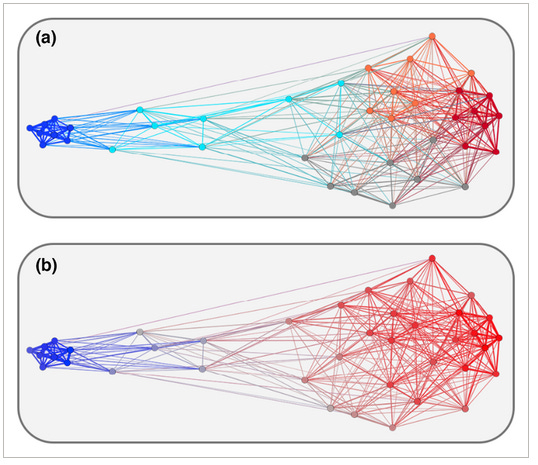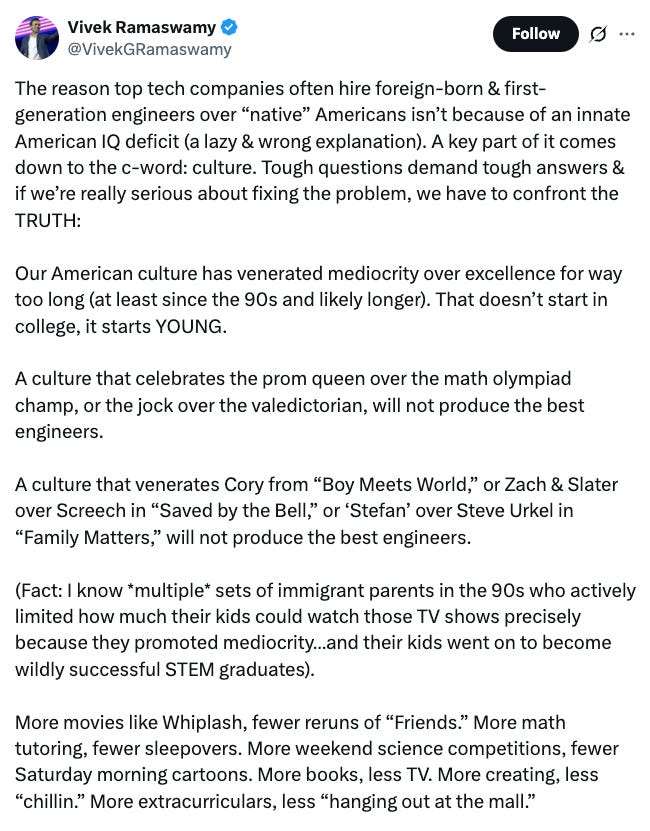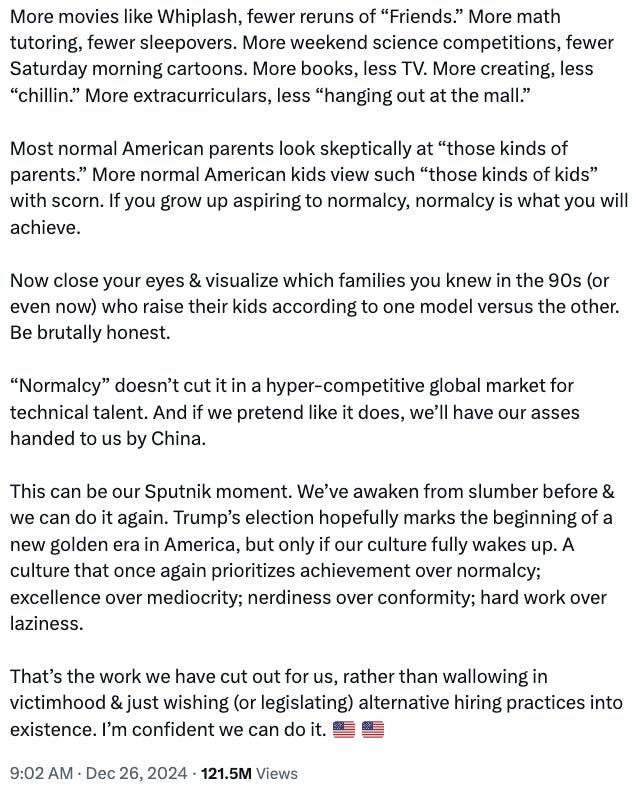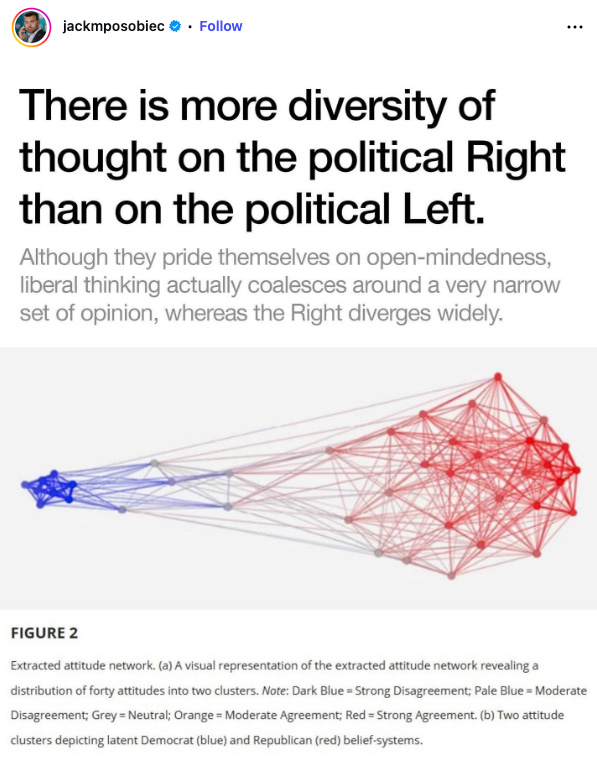Republicans Are Not 'Ideologically Tolerant.' They're Just White.
Examining a new study.
One key to Donald Trump’s political success is convincing many Americans he’s not a Republican, even though he very much is one. By positioning himself as a political outsider and breaking with GOP heterodoxy on a few issues, Trump achieved the best of both worlds. His rhetoric attracts voters who never would’ve supported a corporate suit like Mitt Romney, while his Heritage Foundation-written agenda curries favor with capitalists, fundamental Christians, and other stalwart Republican groups. To amplify this strategy, MAGA thought leaders present their movement as a bastion of free thought, claiming they attract disparate Americans with open-mindedness and intellectual rigor. Despite being the basis for many affluential media careers, the bubble of a ‘free thinking GOP’ pops against the gentlest brush of reality. The core of modern conservatism is undying fealty to Donald Trump. While slight policy deviations might be tolerated, such as small rhetorical concessions on abortion, conservatives have the strictest purity test in contemporary politics: say nice things about the Special Boy King or you’re dead to us.
Never Trump Republicans have been excommunicated from the GOP, to the point that there are few anti-Trump Republican voters and even fewer anti-Trump politicians. It’s not even enough to support Trump most of the time. When Republican Senator Rand Paul criticized the Big Beautiful Bill, the President booted him from the annual White House picnic.12 For Trump’s recent Fort Bragg speech, he instructed the military to only invite soldiers who support him and would clap like seals. (They also couldn’t be ‘fat.’)3 Bari Weiss started a whole university dedicated to intellectual openness, then fired a professor who said DEI wasn’t the worst thing in the world.4 Unsurprisingly, the concept of an intellectually diverse Republican party is a myth, something Trump supporters are trying to speak into existence to convince themselves they’re not supporting ‘their father’s GOP.’ (They are.) Currently, the rightist public relations campaign is being driven by the header image of a study from the British Journal of Social Psychology, which many conservative pundits have celebrated on social media. I say ‘the header image of a study,’ because they clearly didn’t take the time to read it.
The study, entitled ‘Attitude networks as intergroup realities: Using network-modelling to research attitude-identity relationships in polarized political contexts,’5 is fascinating. By recording participants’ answers to eight political questions, then showing those answers to fellow participants and asking them to guess their partisan identity and say how they felt about the respondents, they mapped the ‘ideological clusters’ of Democrats, Republicans, and independents. As you can see, Democratic respondents had a tighter set of political beliefs than their Republican counterparts.

While rightists were quick to spike the football and congratulate themselves for starting the Second Enlightenment, the study refutes that idea. In the discussion section, the researchers write:
‘It is possible that holding extreme (and thus unnegotiable) attitudes on important social-political issues has become increasingly identity-defining for Democrats, not least in response to Donald Trump's controversial presidency. The pattern does not imply that Republicans are more tolerant than Democrats, nor that Republicans could deal better with attitudinal uncertainty. It does imply, however, that –at this particular moment in time– Democrats and Republicans are constructing and managing their partisan identities differently in relation to the topics reflected in these questionnaire items. Research suggests that social category membership (e.g., being White, Christian) is more important for the construction of Republican identity than it is for Democrat identity (Mason & Wronski, 2018). Fulfilling such normative criteria may hence qualify someone as a valid group member even if that same person may hold somewhat liberal views on, for example, gay marriage.’
So, while any group of modern Trump supporters might have more expansive views on gay marriage than a group of Democratic voters, that’s because desired policy outcomes are not what makes someone a Republican. The GOP attracts Americans with ‘cultural issues,’ which inevitably centers the straight, White, Christian male as the head of a traditional family and the rightful steward of the country. The closer you are to this ideal identity, either physically or ideologically, the more likely you are to be a Republican. Conversely, Democrats coalesce around ideas about civil rights, gun control, and other political issues. The study the researchers cite (Mason & Wronski, 20186) explains this:
‘As racial, religious, and ideological identities have cumulatively moved into greater alignment with Democratic and Republican identities in recent decades, American partisans have grown increasingly identified with their parties due to the psychological effects of identity alignment captured in objective and subjective sorting mechanisms. However, we find that this effect is more powerful among Republicans than among Democrats, due to the general social homogeneity of the Republican party. Contrary to the assessments of modern political punditry, Republicans are more susceptible to identity-based politics.’
This isn’t a surprise to anyone who follows politics. 84% of Trump voters are White, continuing the GOP’s racial dominance of White voters that began in 1968.7 To put it as nicely as I can, desired policies are rarely the reason Americans identify as Republican. Recently, the media has been having a field day with stories about Trump voters who were ‘misled’ by the former president. Across publications, the stories are the same. They profile a Trump voter who, having their friends deported8 or being financially ruined by tariffs, claims, ‘I didn’t vote for this!’ During the campaign, Trump was very clear about his plans to deport ten million people and impose sweeping tariffs that would devastate the economy. These voters weren’t lied to; they just liked Trump’s anti-China, anti-immigrant vibe and went along without bothering to ask for details. As the myth that 3% of America’s population are cartel-linked gang members attracted them to the Republican Party, it’s not surprising they have various views on who should be deported.
“I voted for Donald Trump, and so did practically everyone here,” said Vanessa Cowart, a friend of Ms. Hui from church. [Hui was deported by Trump.] “But no one voted to deport moms. We were all under the impression we were just getting rid of the gangs, the people who came here in droves.”
With this context, the chart from the above study makes sense. While Democratic voters tend to coalesce around ideas, such as strong beliefs in reproductive rights, marriage equality, and racial equality, Republican voters are drawn more to the GOP’s White identity politics, which started to counteract the Civil Rights Movement and continues as a backlash to an imagined woke revolution. Here’s Trump ally Charlie Kirk explicitly stating MAGA’s goal is an imaginary flag-waving White town. Not ‘We’re going to increase your wages’ or ‘Make education more affordable,’ just a shitty AI image that eases their racial anxieties and offers a vague concept of ‘America.’ This is what the GOP sells Americans, seldom offering the specifics on how they plan to achieve it.
Drawn in by their proximity to the ideal citizen of a White, straight man, it’s no surprise that Republican voters have broader views on select political questions. Having shared beliefs is what makes Democratic voters Democrats. Conversely, desiring a racial, social, and class hierarchy is (generally) what pulls someone to the Republican Party. (This is not to say the Democratic Party delivers on these issues. But they certainly attract voters with appeals to social cohesion.) Democrat voters are highly likely to strongly oppose the statement 'Abortion should be illegal,’ while Republican voters, whose political affiliation comes from their personal traits rather than the specifics of their political beliefs, will have broader responses than the ‘extreme’ position taken by the Democrat respondents.
A perfect example of the Republican Party’s faux ideological tolerance covering racial supremacy can be found in the GOP’s treatment of Vivek Ramaswamy. Last year, Ramaswamy sat for an interview with Anne Coulter. Coulter applauded Ramaswamy’s political ideas, but said she wouldn’t vote for him because he’s ‘Indian.’
A total coward, Ramaswamy said nothing and accepted the degradation of himself, his children, his entire family, and his ancestral country. Placating White identity politics kept Ramaswamy in the GOP’s good graces for a while. He was even appointed to co-head DOGE with Elon Musk. But when Ramaswamy challenged the GOP’s White supremacist core by saying White Americans needed to improve their culture to compete with immigrants, he was thrown out of the administration, never to be heard from again.


As Anne Coulter said, Republicans liked Ramaswamy’s political ideas as long as he accepted the GOP’s belief that Brown people are inferior to White Americans. As soon as he suggested otherwise, he was thrown out. (Some might say he was cancelled!)
When it comes to the American right, every accusation is an admission. They claim they’re open-minded to distract from the fact that they’re more akin to a cult than a political party. They decry purity tests, yet demand that all participants accept an outdated racial and gendered hierarchy. The Republican Party is not intellectually tolerant. One must surrender one's tongue, abandon human decency, and kiss the boot of Donald Trump to even be allowed in.
The word ‘Orwellian’ is frequently overused, but the Republican Party calling itself ‘ideologically tolerant’ certainly justifies its use.
If you appreciated this article, please click the ❤️ to help my work rise in Substack’s algorithm. If you’re a returning reader who appreciates JoeWrote (even sometimes), consider upgrading to a supporting subscription. It costs one cup of coffee a month (less if your subscribe annually) gives you exclusive bonus content, and ensures I can keep creating progressive content that dispels Republican narratives.
In Solidarity — Joe
https://www.nbcnews.com/politics/congress/sen-rand-paul-says-was-uninvited-white-house-picnic-breaks-trump-rcna212499
Trump later re-invited Paul, but not before making his point.
https://www.the-independent.com/news/world/americas/us-politics/trump-fort-bragg-speech-soldiers-screened-appearance-b2768400.html
https://x.com/paulg/status/1928729781664723073
https://bpspsychub.onlinelibrary.wiley.com/doi/10.1111/bjso.12665
https://onlinelibrary.wiley.com/doi/10.1111/pops.12485
https://www.brookings.edu/articles/trump-gained-some-minority-voters-but-the-gop-is-hardly-a-multiracial-coalition/
https://www.nytimes.com/2025/05/28/us/missouri-immigrant-trump.html




“Contrary to the assessments of modern political punditry, Republicans are more susceptible to identity-based politics.” lol
I think there's diversity of ideology because they don't actually have one, it's just stand behind Trump. You can be a frog-right ancap, or a social conservative with welfare sympathies like Josh Hawley, and be accepted as long as you back Trump.